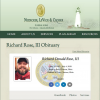It should work to stop the most common way of transmitting the virus -- inhaling fine droplets of spit, saliva and water vapor from the mouths and airways of people who are infected. I don't know about aerosols of dry fine particles that can float in the air for quite a while after an infected person leaves an area. These small (<5um), stable and long lasting particles are becoming more of a concern as we learn more about this new virus.
Can an air purifier kill coronavirus? No. But Consumer Reports' experts explain how an air purifier could help protect your family if someone at home is sick with COVID-19.
www.consumerreports.org
HEPA filters are very effective, certified to capture 99.97 percent of particles that are precisely 0.3 micron in diameter. (Particles that size are perfectly suited to maneuver through the filter’s fibers, while larger and smaller particles, because of the various ways they move in the air, crash into the structure.)
The novel coronavirus itself is 0.125 microns, but Marr says the droplets it travels in—when people cough, talk, or breathe—initially are larger, around 1 micron. That's a size easily captured by HEPA filters.
James Dickerson, CR’s chief science officer echoes the consensus that air purifiers could help in some situations,
If a person spends all day with the public and doesn't want to wear the proven effective and approved n95 masks, it's a better alternative to the simple surgical masks that aren't all that effective at stopping air borne particles from being inhaled. It's your 175 bucks to spend as you like. Me, I'd either wear the proven effective and cheaper mask if I were working with the public.






